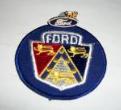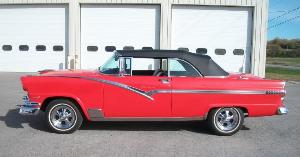|
Author
|
Message
|
|
BPoland858
|
|
|
Group: Forum Members
Last Active: 11 Years Ago
Posts: 29,
Visits: 1.7K
|
I want to add some after market gauges (hung under the dash) to my 1957 T-Bird (312 4V). My criteria is simple. I don't want to drill, tap and make as few changes under the hood as possible. I would like to add a volt and water temp gauge. I remember reading about a temp gauge where the temperature probe (wire) slides under the top radiator hose and then can be routed back to the firewall . The gauges in my car are are not accurate and I want a better idea of what the engines doing.
Any suggestions would be greatly appreciated.Thanks in advance.
Bill Poland312 V8 - in a 1957 T-Bird Baltimore, Maryland
|
|
|
|
|
oldcarmark
|
|
|
Group: Forum Members
Last Active: 7 days ago
Posts: 3.7K,
Visits: 32.6K
|
The voltmeter is easy.Dont use an ammmeter.Much harder to hook up.Run a wire from the accessory terminal(hot when key is turned to 1st position right) of the ignition switch to the + side of gauge.The - terminal on gauge goes to ground on dash.The temp gauge could be installed in the right cylinder head where the opening has a plug.The same place the temp sender goes on the left cylinder head.You will need a press-in bushing as used on the left head for the sender to screw into.The opening in the head is NOT threaded.Either that or remove the stock sender in left head and install sender from aftermarket gauge.Are you planning on using a mechanical(direct reading)temp gauge or electrical type?
 
|
|
|
|
|
peeeot
|
|
|
Group: Forum Members
Last Active: Last Year
Posts: 357,
Visits: 25.5K
|
I'm not certain about your Thunderbird, but on both '59 Fords I've owned (and one was a t-bird) the gauges are adjustable. Even if it doesn't give a temp readout in degrees, you could calibrate it well enough to let you know whether the engine is running colder or hotter than usual. If the gauges don't work at all, or the needles pulsate, your instrument voltage regulator is probably at fault (again, assuming you have one).
1954 Crestline Victoria 312 4-bbl, 3-speed overdrive
|
|
|
|
|
BPoland858
|
|
|
Group: Forum Members
Last Active: 11 Years Ago
Posts: 29,
Visits: 1.7K
|
oldcarmark - I really don't have a preference as to the type of gauge. My only preference is for ease of installation. That's why I was interested in the gauge that has the probe/wire that slides under the top radiator hose. Peeeot - Temp gauge pegged at hot one minute and cold the next, this happened while traveling at 65 mph on a cool night run (65 degrees). The car wasn't overheating, and when I slowed for an exit, I looked down and the gauge was on cold. I just want a couple gauges that will give me accurate information.
Bill Poland312 V8 - in a 1957 T-Bird Baltimore, Maryland
|
|
|
|
|
oldcarmark
|
|
|
Group: Forum Members
Last Active: 7 days ago
Posts: 3.7K,
Visits: 32.6K
|
If you measure temp at rad hose its not accurate for engine temp.The easiest temp gauge to install is the electric type because of ease of running wire to sending unit.The good name brand ones like Stewart-Warner should be very accurate.The mechanical type use a "tube" to send temp to gauge and you have to be careful not to crimp it when installing.No electrical hookup except for light for gauge.I had the intake manifold drilled and tapped just back of the stat housing to install my mechanical temp gauge.
 
|
|
|
|
|
Bob's 55
|
|
|
Group: Forum Members
Last Active: 11 Years Ago
Posts: 287,
Visits: 1.0K
|
Sounds more like your temperature sending unit than a bad gauge. But that's not what you asked.
I prefer mechanical gauges myself but for ease of installation I would suggest an electrical water temperature gauge so you don't have to deal with the large capillary connecting the gauge to the sender.
Also may I suggest adding a oil pressure gauge along with the other two gauges you selected. I don't have much trust in 'idiot lights'.
Since my stock temperature sending unit didn't work I put the new one in the left head. It will fit in the right head if you want to keep the original altho it can get a little tight with the distributor. I have a temperature switch in my right head controlling the electric fan.
I also still like the S/W black and white 'classic' gauges in our cars, they just go with the time period. And of course all the above, as always is just my 1¢ worth.
BOB
|
|
|
|
|
Bob's 55
|
|
|
Group: Forum Members
Last Active: 11 Years Ago
Posts: 287,
Visits: 1.0K
|
Dang OldMark, we posted at the same time...
BOB
|
|
|
|
|
oldcarmark
|
|
|
Group: Forum Members
Last Active: 7 days ago
Posts: 3.7K,
Visits: 32.6K
|
You know what they say about GREAT minds Bob.They think alike.We just proved it. MARK
 
|
|
|
|
|
paul2748
|
|
|
Group: Forum Members
Last Active: Yesterday
Posts: 3.6K,
Visits: 497.8K
|
BPoland858 (9/12/2010)
I want to add some after market gauges (hung under the dash) to my 1957 T-Bird (312 4V). My criteria is simple. I don't want to drill, tap and make as few changes under the hood as possible. I would like to add a volt and water temp gauge. I remember reading about a temp gauge where the temperature probe (wire) slides under the top radiator hose and then can be routed back to the firewall . The gauges in my car are are not accurate and I want a better idea of what the engines doing.
Any suggestions would be greatly appreciated.
Thanks in advance.
As far as the temperature gauge where the probe fits into (under) the radiator hose, it is from Grainger. The part number is 5XL18. It has a sensor lead of about 10 feet. and the cost is about 30 bucks. All you do is position the sensor into the thermostat housing and then slip the hose on. Just apply a dab of RTV around the wire so there won't be any problem with leakage. You don't have to mount it, you can hide it under the dash. It uses an AAA battery for power so no wire connections. AS far as the voltmeter is concerned, they are relatively inexpensive and power should be hooked up to any wire that goes live when the key is on, like an accessory pole on the starter switch. No under hood connections.
54 Victoria 312; 48 Ford Conv 302, 56 Bird 312
Forever Ford
Midland Park, NJ
|
|
|
|
|
peeeot
|
|
|
Group: Forum Members
Last Active: Last Year
Posts: 357,
Visits: 25.5K
|
I'm getting the impression that it doesn't matter whether the original gauge works or not, but I thought I would input that based on what you describe it is likely that the instrument voltage regulator points stuck together resulting in a constant 12V supply to the temp gauge, which likely overheated the gauge causing the heating wire within it to fracture (thus killing the gauge). Depending on where the heating wire broke, it may be repairable. If the voltage regulator points did stick, you would have observed a similar spike in your fuel gauge, and it probably would have stopped working too. If the behavior was limited to the temp gauge, then it would seem that the wire to the temp sending unit was shorted to ground somehow, which would also max out the gauge and kill it.
1954 Crestline Victoria 312 4-bbl, 3-speed overdrive
|
|
|
|